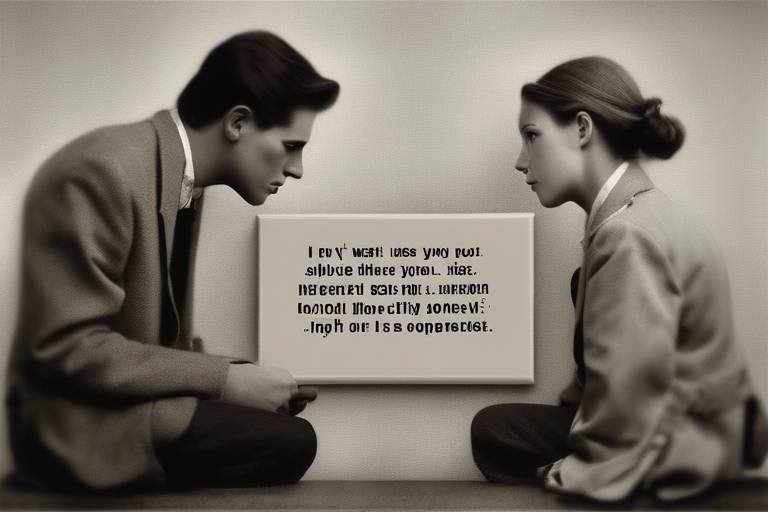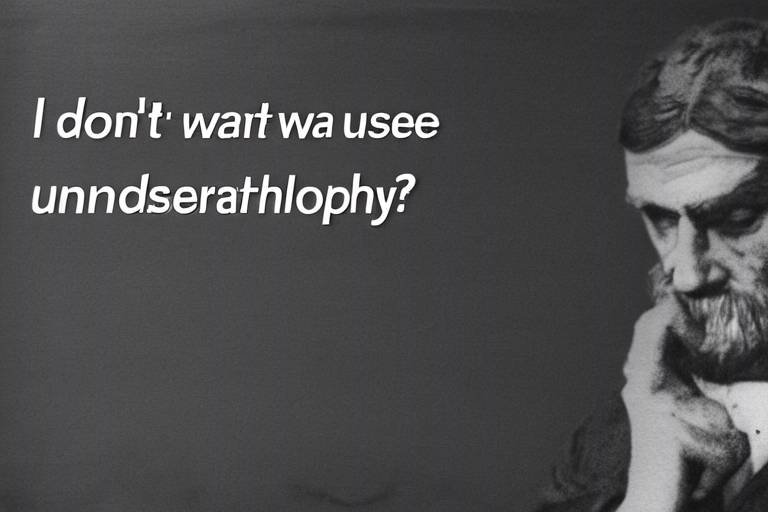Recognizing the Importance of Philosophical Foundations
Philosophy is often viewed as a dusty old discipline, tucked away in the corners of academia, but it actually plays a vital role in shaping our understanding of the world. From the way we approach education to how we navigate ethical dilemmas, philosophical foundations are like the invisible threads that weave through various disciplines and decision-making processes. Imagine trying to build a house without a solid foundation; it would be unstable and prone to collapse. Similarly, without philosophical grounding, our understanding of complex issues can become shaky and unreliable.
At its core, philosophy encourages us to ask fundamental questions about existence, knowledge, values, reason, and ethics. These inquiries are not just intellectual exercises; they have real-world implications. For instance, consider how philosophical principles guide our understanding of justice and fairness in society. When we ponder questions like, "What is the right thing to do?" or "What does it mean to live a good life?" we are engaging with philosophical ideas that influence our behavior and societal norms.
Moreover, philosophy acts as a bridge between various fields. In education, it fosters critical thinking, helping students to question assumptions and analyze arguments. In science, philosophical inquiry shapes methodologies and ethical considerations, ensuring that advancements benefit society as a whole. In politics, philosophical theories provide frameworks for governance and justice, influencing policies that affect our daily lives.
As we delve deeper into the significance of philosophical foundations, we uncover their impact on ethical decision-making. Whether in personal dilemmas or public policy, philosophy offers a compass to navigate the complexities of morality. The examination of different ethical theories, such as consequentialism and deontology, reveals how these philosophies inform our choices and actions. This exploration not only enriches our understanding but also equips us with the tools to make informed, ethical decisions.
In summary, recognizing the importance of philosophical foundations is essential for developing a comprehensive understanding of various disciplines. It is through philosophy that we can engage critically with the world around us, fostering a more thoughtful and ethical society.
- What is the main purpose of philosophy?
Philosophy aims to explore fundamental questions about existence, knowledge, values, and ethics, providing frameworks for understanding and decision-making. - How does philosophy influence education?
Philosophy enhances critical thinking skills, encouraging students to analyze arguments and question assumptions, which are crucial for intellectual development. - What are the main ethical theories in philosophy?
The two primary ethical theories are consequentialism, which focuses on outcomes, and deontology, which emphasizes adherence to rules and duties. - Why is philosophy important in science?
Philosophy shapes scientific methodologies and addresses the ethical implications of scientific advancements, ensuring responsible progress in society. - How does philosophy affect politics?
Philosophical ideas inform governance structures, justice, and individual rights, influencing public policy and societal organization.

The Role of Philosophy in Education
Philosophy serves as a cornerstone in education, providing frameworks for critical thinking, ethics, and the pursuit of knowledge, which are essential for developing well-rounded individuals. Imagine walking into a classroom where students are not just passive recipients of information but active participants in their learning journey. This dynamic environment is fueled by philosophical inquiry, encouraging students to question, analyze, and synthesize information rather than merely memorizing facts. By fostering critical thinking skills, philosophy empowers students to engage with complex ideas and develop their own viewpoints.
Furthermore, philosophy emphasizes the importance of ethics in education. In a world where moral dilemmas are commonplace, equipping students with the ability to navigate these challenges is invaluable. For instance, discussions around topics such as fairness, justice, and responsibility can lead to profound insights that shape students' character and decision-making skills. When students learn to consider the ethical implications of their actions, they become not just informed individuals but also responsible citizens who contribute positively to society.
Incorporating philosophical teachings into the curriculum can take various forms, including:
- Critical Thinking Exercises: Engaging students in debates and discussions that require them to articulate their thoughts and defend their positions.
- Ethical Case Studies: Analyzing real-world scenarios to explore moral dilemmas and the principles that guide decision-making.
- Philosophical Texts: Introducing students to the works of great philosophers, allowing them to grapple with fundamental questions about existence, knowledge, and ethics.
Moreover, philosophy encourages a culture of inquiry and curiosity. By instilling a love for learning, students are motivated to explore subjects beyond the confines of the classroom. This thirst for knowledge not only enhances their academic performance but also prepares them for lifelong learning—a skill that is increasingly important in our rapidly changing world. In essence, the role of philosophy in education transcends mere academic achievement; it cultivates a holistic approach to personal development.
Ultimately, the integration of philosophical foundations in education creates a nurturing environment where students can thrive intellectually and ethically. By fostering critical thinking, ethical reasoning, and a passion for lifelong learning, philosophy lays the groundwork for a brighter future—one where individuals are equipped to face the complexities of life with confidence and integrity.
- Why is philosophy important in education?
Philosophy is crucial in education as it promotes critical thinking, ethical reasoning, and a deeper understanding of knowledge, preparing students for real-world challenges. - How can teachers incorporate philosophy into their classrooms?
Teachers can incorporate philosophy through discussions, debates, ethical case studies, and by introducing philosophical texts that encourage inquiry. - What are some benefits of teaching philosophy to students?
Teaching philosophy helps develop analytical skills, enhances moral reasoning, and fosters a lifelong love of learning among students.

Philosophy and Ethical Decision-Making
When we think about ethical decision-making, it’s hard not to appreciate the profound influence that philosophy has on our choices. Philosophy provides the tools and frameworks necessary to navigate the murky waters of moral dilemmas. Imagine standing at a crossroads, with each path representing a different ethical choice; philosophy acts as your guide, illuminating the potential consequences of each decision. By grounding our decisions in philosophical principles, we can approach complex situations with a clearer sense of purpose and integrity.
At its core, ethical decision-making is about more than just choosing between right and wrong. It involves a deep understanding of the values and principles that drive our actions. Here, philosophy plays a crucial role by offering various ethical frameworks that help us analyze situations from multiple perspectives. These frameworks encourage us to ask critical questions, such as: What are the implications of my actions? Who will be affected by my choices? And most importantly, what kind of person do I want to be?
To illustrate this, let’s delve into two major ethical theories: consequentialism and deontology. These approaches provide contrasting lenses through which we can evaluate our decisions. Consequentialism focuses on the outcomes of our actions, suggesting that the morality of an act is determined by its results. On the other hand, deontological ethics emphasizes the importance of adhering to rules and duties, regardless of the consequences. This duality highlights the complexity of ethical decision-making and the necessity of philosophical inquiry in guiding our choices.
For example, consider a situation where a company must decide whether to cut costs by laying off employees. A consequentialist might argue that if the layoffs lead to greater overall profit, the decision is justified. Conversely, a deontologist would contend that the company has a moral obligation to its employees, regardless of the financial implications. This clash of perspectives illustrates how philosophy shapes our understanding of ethics and influences our decision-making processes.
Furthermore, the application of ethical theories can be seen in various fields, from business to healthcare. In healthcare, for instance, professionals often face dilemmas where they must balance patient autonomy with the principle of beneficence. Here, philosophy provides the necessary frameworks to ensure that decisions are made thoughtfully and ethically. It’s not just about making a choice; it’s about making an informed and responsible choice.
In conclusion, the intersection of philosophy and ethical decision-making is not merely an academic exercise; it’s a practical necessity in our daily lives. By engaging with philosophical principles, we equip ourselves with the tools to navigate moral complexities and make decisions that reflect our values. Whether we’re making personal choices or influencing larger societal issues, philosophy remains an indispensable ally in our quest for ethical clarity.
- What is the role of philosophy in ethical decision-making? Philosophy provides frameworks and principles that guide individuals in evaluating moral dilemmas and making responsible choices.
- How do consequentialism and deontology differ? Consequentialism focuses on the outcomes of actions, while deontology emphasizes adherence to moral rules and duties.
- Why is ethical decision-making important? It helps individuals and organizations make informed choices that align with their values and responsibilities to others.
- Can philosophy help in everyday decision-making? Absolutely! Engaging with philosophical principles can enhance our critical thinking and ethical reasoning in daily situations.

Consequentialism vs. Deontology
When it comes to ethical decision-making, the debate between consequentialism and deontology is one of the most significant philosophical discussions. These two frameworks represent fundamentally different approaches to understanding morality and guiding our actions. Picture a scale: on one side, you have the outcomes of actions, and on the other, the adherence to rules and duties. This metaphor beautifully illustrates the tension between these two schools of thought.
Consequentialism posits that the morality of an action is determined solely by its outcomes. In simpler terms, if an action leads to a positive result, it is considered morally right, while a negative outcome renders it wrong. This perspective can be incredibly appealing, especially in situations where the consequences are clear-cut. For instance, if a decision saves lives, it is justified, regardless of the means taken to achieve that end. However, this approach raises questions: does the end always justify the means? Are there situations where achieving a good outcome could involve morally questionable actions?
On the flip side, we have deontology, which argues that the morality of an action is based on whether it adheres to a set of rules or duties, regardless of the consequences. This approach is often associated with the philosopher Immanuel Kant, who believed that actions should be guided by universal principles. For example, telling the truth is considered a moral obligation, even if lying might lead to a better outcome in a specific situation. This perspective emphasizes the importance of integrity and moral laws, but it can also lead to rigid decision-making processes where the nuances of a situation might be overlooked.
To illustrate these concepts further, let’s consider a real-world scenario: imagine a doctor faced with the choice of allocating a scarce resource, like a life-saving medication. A consequentialist might argue for administering the drug to the patient with the highest chance of survival, as this would maximize overall health benefits. Conversely, a deontologist would advocate for treating all patients equally, adhering to the principle that every life is of equal value, regardless of the potential outcomes. This dilemma encapsulates the essence of the clash between these two ethical theories.
In summary, while both consequentialism and deontology offer valuable insights into ethical decision-making, they also present unique challenges. The choice between focusing on outcomes or adhering to duties can lead to vastly different conclusions about what is morally right. Understanding these frameworks not only enriches our perspective on ethics but also equips us to navigate the complex moral landscapes we encounter in life.
- What is the main difference between consequentialism and deontology? Consequentialism focuses on the outcomes of actions, while deontology emphasizes adherence to moral rules and duties.
- Can you provide an example of consequentialism in action? A classic example is utilitarianism, where actions are judged based on their ability to produce the greatest happiness for the greatest number.
- What are some criticisms of deontology? Critics argue that deontology can lead to rigid and impractical moral decisions, ignoring the complexities of real-world situations.

Utilitarianism
Utilitarianism is a fascinating ethical theory that emphasizes the outcomes of actions as the primary basis for any judgment about their moral worth. At its core, this philosophy advocates for actions that promote the greatest happiness for the greatest number of people. Imagine a scenario where a community faces a dilemma: should they allocate limited resources to build a new park or improve the local hospital? A utilitarian approach would focus on which option yields the highest overall benefit to the community's well-being.
Developed by philosophers like Jeremy Bentham and later expanded by John Stuart Mill, utilitarianism operates on a simple yet powerful principle: the greatest happiness principle. This principle suggests that the moral rightness of an action is determined by its contribution to overall utility, which is often understood as happiness or pleasure. In practical terms, this means that when faced with a choice, one should consider the potential outcomes and choose the action that maximizes positive results.
Utilitarianism can be broken down into two main forms: act utilitarianism and rule utilitarianism. Act utilitarianism evaluates each action on a case-by-case basis, while rule utilitarianism suggests that we should follow rules that generally promote the greatest good. This distinction is crucial because it highlights the flexibility of utilitarian thought. For instance, while lying might typically be considered wrong, a utilitarian might argue that if lying leads to a greater overall happiness, then it could be justified.
One of the key strengths of utilitarianism is its straightforwardness; it provides a clear method for evaluating actions based on their consequences. However, it also faces significant criticisms. Critics argue that it can justify morally questionable actions if they lead to a perceived greater good. For example, if sacrificing one individual could save a larger group, a strict utilitarian approach might endorse that sacrifice, raising profound ethical questions about individual rights and justice.
To provide a clearer understanding, let’s look at a simple table that contrasts the strengths and weaknesses of utilitarianism:
| Strengths | Weaknesses |
|---|---|
| Clear and straightforward decision-making process | Can justify harmful actions for the greater good |
| Focuses on overall happiness and well-being | Neglects individual rights and justice |
| Flexible and adaptable to various situations | Difficult to measure happiness quantitatively |
In conclusion, utilitarianism serves as a powerful lens through which we can examine ethical dilemmas. It encourages us to think critically about the consequences of our actions and to prioritize the well-being of the majority. Yet, as with any philosophical framework, it is essential to approach it with a balanced perspective, recognizing both its potential benefits and its limitations. Engaging with utilitarian principles can lead to more thoughtful and responsible decision-making, particularly in areas like public policy, healthcare, and environmental ethics.
- What is utilitarianism?
Utilitarianism is an ethical theory that suggests that the best action is the one that maximizes overall happiness or utility. - Who are the main philosophers associated with utilitarianism?
Jeremy Bentham and John Stuart Mill are the most notable figures in the development of utilitarian thought. - What are the two types of utilitarianism?
The two types are act utilitarianism, which evaluates individual actions, and rule utilitarianism, which focuses on following rules that generally promote happiness. - What are some criticisms of utilitarianism?
Critics argue that it can justify immoral actions if they result in a greater good, and it often overlooks individual rights.

Kantian Ethics
Kantian ethics, rooted in the philosophy of Immanuel Kant, presents a compelling framework for moral reasoning that emphasizes the importance of duty and adherence to universal moral laws. Unlike consequentialist theories that focus primarily on the outcomes of actions, Kantian ethics argues that the **moral worth** of an action is determined by the intention behind it and whether it aligns with a set of universal principles. This approach encourages individuals to act according to maxims that can be universally applied, essentially asking, "What if everyone did this?" This question serves as a litmus test for ethical behavior, prompting individuals to consider the broader implications of their actions.
At the heart of Kantian ethics lies the **Categorical Imperative**, a central concept that dictates that one should only act according to that maxim which they can will to become a universal law. This principle is crucial because it demands consistency and fairness in moral decision-making. For example, if one were to lie, they must consider whether it would be acceptable for everyone to lie in similar situations. If the answer is no, then lying is deemed unethical. This framework not only promotes accountability but also fosters a sense of respect for others, as it underscores the importance of treating individuals as ends in themselves, rather than merely as means to an end.
Moreover, Kantian ethics has significant implications for various fields, including law, politics, and personal relationships. In the realm of law, for instance, the emphasis on duty and rights aligns closely with the principles of justice and the rule of law. Kantian ethics advocates for the protection of individual rights and upholds the idea that every person deserves to be treated with dignity and respect. This perspective shapes legislative frameworks and influences how societies define justice and fairness.
To illustrate the application of Kantian ethics, consider the following table that contrasts Kantian principles with consequentialist views:
| Aspect | Kantian Ethics | Consequentialism |
|---|---|---|
| Focus | Intentions and duties | Outcomes and results |
| Moral Worth | Determined by adherence to universal laws | Determined by the happiness or utility produced |
| Key Principle | Categorical Imperative | Greatest Happiness Principle |
| Example | Lying is wrong regardless of the outcome | Lying may be acceptable if it leads to a better outcome |
In conclusion, Kantian ethics offers a robust framework for navigating moral dilemmas by emphasizing the significance of duty and the inherent value of individuals. By encouraging us to act according to universal maxims, it fosters a sense of responsibility and integrity in our interactions with others. As we grapple with complex ethical challenges in today’s world, the principles of Kantian ethics remain a vital compass, guiding us toward decisions that honor both our duties and the rights of others.
- What is the main idea behind Kantian ethics?
Kantian ethics emphasizes the importance of intentions and adherence to universal moral laws, rather than focusing solely on the outcomes of actions. - How does the Categorical Imperative work?
The Categorical Imperative is a principle that suggests one should only act in a way that could be a universal law, prompting individuals to consider the broader implications of their actions. - What are the implications of Kantian ethics in modern society?
Kantian ethics influences various fields such as law and politics by promoting justice, individual rights, and the inherent dignity of all people.

Philosophy in Science
Philosophy and science are like two sides of the same coin, intricately linked in their quest for understanding the universe. The philosophical foundations of science provide the essential frameworks that guide scientific inquiry, shaping the methodologies we use and defining the very concepts we explore. At the heart of this relationship lies a fundamental question: What does it mean to know something? This question pushes scientists to think critically about their assumptions and the implications of their findings.
One of the primary roles of philosophy in science is to address the epistemological questions surrounding knowledge. For instance, how do we know what we claim to know? Are our scientific theories merely approximations of reality, or do they reflect an objective truth? These questions are crucial because they influence how scientists interpret data and develop theories. A well-defined philosophical approach helps scientists articulate their ideas clearly, ensuring that their conclusions are not just based on empirical evidence but also on sound reasoning.
Moreover, philosophy plays a vital role in the ethical implications of scientific advancements. As we delve deeper into areas like genetic engineering, artificial intelligence, and climate change, the ethical considerations become more complex. Philosophical inquiry encourages scientists to consider the broader impacts of their work on society. For example, when developing new technologies, scientists must ask themselves: What are the potential risks and benefits to humanity? This kind of reflective thinking is essential for responsible innovation.
To illustrate the interplay between philosophy and science, consider the following table that outlines key philosophical concepts and their impact on scientific practices:
| Philosophical Concept | Impact on Science |
|---|---|
| Empiricism | Emphasizes observation and experimentation as the basis for knowledge. |
| Falsifiability | Encourages scientists to formulate hypotheses that can be tested and potentially disproven. |
| Reductionism | Promotes understanding complex systems by breaking them down into simpler components. |
| Scientific Realism | Argues that scientific theories aim to describe the world as it truly is. |
In addition to these concepts, philosophical discussions often lead to the development of new scientific paradigms. For example, the shift from Newtonian physics to quantum mechanics was not just a scientific revolution but also a philosophical one. It challenged our understanding of reality, prompting scientists to rethink fundamental notions of causality, determinism, and the nature of existence itself.
Ultimately, the relationship between philosophy and science is a dynamic and evolving one. As we continue to explore the mysteries of the universe, the philosophical questions that arise will only grow in significance. By engaging with these questions, scientists can ensure that their work not only advances knowledge but also contributes positively to society. So, the next time you ponder a scientific breakthrough, take a moment to reflect on the philosophical foundations that made it possible. After all, every great discovery is rooted in a question, and every question invites us to think deeper.
- What is the role of philosophy in scientific inquiry?
Philosophy provides the foundational frameworks that guide scientific methods and ethical considerations, helping scientists to articulate their ideas and understand the implications of their work. - How does philosophy influence ethical decision-making in science?
Philosophical inquiry encourages scientists to consider the broader impacts of their work on society, ensuring responsible innovation and addressing moral dilemmas. - Can scientific theories be influenced by philosophical concepts?
Yes, philosophical concepts such as empiricism and falsifiability shape how scientific theories are formulated and tested, impacting the direction of scientific research. - Why is it important to understand the philosophical foundations of science?
Understanding these foundations enhances critical thinking, promotes ethical considerations, and fosters a deeper appreciation for the complexities of scientific inquiry.

Philosophy's Influence on Politics
Political theory is not just a collection of ideas; it is a vibrant tapestry woven from the threads of philosophical thought. The influence of philosophy on politics is profound, shaping the way we understand governance, justice, and individual rights. At its core, philosophy challenges us to ask fundamental questions about the nature of power and authority. For instance, what makes a government legitimate? How do we define justice? These are not just abstract queries; they have real-world implications that affect our daily lives.
Consider how philosophical ideas have historically informed political structures. From the ancient Greeks, who debated democracy and governance, to modern thinkers who challenge the status quo, philosophy provides the foundation upon which political ideologies are built. This influence can be seen through various philosophical frameworks that guide political thought, such as:
- Utilitarianism: This philosophy suggests that the best action is the one that maximizes overall happiness. In political contexts, this often translates into policies aimed at promoting the greatest good for the greatest number.
- Libertarianism: Rooted in the belief of individual freedom, this philosophy emphasizes minimal state intervention in personal lives, advocating for personal responsibility and autonomy.
- Marxism: A critical approach that examines class struggles and advocates for a classless society, challenging existing power structures and economic inequalities.
These philosophical perspectives not only provide a lens through which we can analyze political systems but also guide the development of laws and policies. For example, consider the impact of John Locke's ideas on natural rights. His assertion that individuals possess inherent rights to life, liberty, and property has profoundly influenced democratic governance and human rights legislation worldwide. Locke's philosophy laid the groundwork for modern democracy, emphasizing the importance of consent and the social contract.
Moreover, philosophy plays a critical role in shaping public discourse. It encourages citizens to engage in discussions about their rights and responsibilities, fostering a culture of critical thinking and civic engagement. When individuals understand the philosophical underpinnings of their government, they are better equipped to challenge injustices and advocate for change. This is vital in a democratic society where the voices of the people should resonate in the halls of power.
In addition, the relationship between philosophy and politics is not static; it evolves with societal changes. As new challenges arise—be it climate change, technological advancements, or social justice movements—philosophical inquiry continues to adapt and respond. This dynamic interplay ensures that political theories remain relevant and grounded in the realities of contemporary life.
To illustrate this point further, let’s take a look at how different political philosophies address current issues:
| Political Philosophy | Current Issue | Approach |
|---|---|---|
| Utilitarianism | Healthcare Access | Policies aimed at maximizing public health outcomes for the majority. |
| Libertarianism | Data Privacy | Advocating for minimal government surveillance and protecting individual data rights. |
| Marxism | Income Inequality | Promoting systemic change to redistribute wealth and empower the working class. |
In conclusion, the influence of philosophy on politics is undeniable. It provides the tools necessary for understanding complex issues, guiding ethical governance, and fostering a more engaged citizenry. As we navigate the intricacies of modern political landscapes, it is essential to recognize and appreciate the philosophical foundations that shape our world. After all, the questions we ask today will determine the policies we implement tomorrow.
Q: How does philosophy affect our daily political decisions?
A: Philosophy shapes the frameworks within which we make decisions, influencing our beliefs about justice, rights, and governance. When we engage with philosophical ideas, we become more informed citizens capable of making thoughtful political choices.
Q: Can philosophy provide solutions to contemporary political issues?
A: Yes, philosophical inquiry can offer insights and frameworks for addressing modern challenges. By applying philosophical principles, we can develop policies that reflect our values and promote the common good.
Q: Why is it important to study political philosophy?
A: Studying political philosophy equips individuals with critical thinking skills and a deeper understanding of the principles that govern society. It encourages active participation in civic life and helps us challenge injustices effectively.

Social Contract Theory
The concept of is a fascinating cornerstone in political philosophy that examines the legitimacy of authority and the relationship between individuals and the state. Imagine if society were a giant game of chess; every piece has its role, and the rules dictate how they interact. This theory proposes that individuals consent, either explicitly or implicitly, to surrender some of their freedoms and submit to the authority of a governing body in exchange for protection of their remaining rights. In essence, it's like trading a slice of your freedom for a larger cake of security.
Philosophers like Thomas Hobbes, John Locke, and Jean-Jacques Rousseau have offered distinct interpretations of this theory, each painting a different picture of what the social contract entails and its implications for governance. For Hobbes, life in the state of nature is "solitary, poor, nasty, brutish, and short," leading him to advocate for a strong, centralized authority to maintain peace and prevent chaos. In contrast, Locke viewed the social contract as a means to protect natural rights—life, liberty, and property—arguing that the government should serve the people and can be overthrown if it fails to do so. Rousseau, on the other hand, emphasized the collective will of the people, suggesting that true freedom is found in the general will, where individuals act in accordance with the common good.
This theory raises several critical questions: What rights are we willing to give up? What obligations do we owe to the state? And how do we ensure that the government remains accountable to the people? These questions are not just theoretical musings; they resonate deeply in today's political climate, where debates about individual rights versus state authority continue to unfold.
To illustrate the various interpretations of the social contract, let's take a look at the following table:
| Philosopher | View on Social Contract | Key Concepts |
|---|---|---|
| Thomas Hobbes | Absolute authority to prevent chaos | Leviathan, security, surrender of rights |
| John Locke | Government as a protector of rights | Natural rights, consent, rebellion |
| Jean-Jacques Rousseau | Collective will for true freedom | General will, community, equality |
As we navigate the complexities of modern governance, the principles of Social Contract Theory remain relevant. They challenge us to consider the balance between freedom and security, and they remind us of our role in shaping the laws and systems that govern us. Are we merely passive participants in this social contract, or do we actively engage in holding our leaders accountable? The answers to these questions not only define our political landscape but also shape our collective future.
- What is Social Contract Theory?
It is a political theory that explores the legitimacy of authority and the relationship between individuals and the state. - Who are the key philosophers associated with Social Contract Theory?
Thomas Hobbes, John Locke, and Jean-Jacques Rousseau are the most notable figures. - How does Social Contract Theory apply to modern governance?
It raises questions about individual rights, state authority, and accountability in governance.

Utilitarianism in Policy Making
Utilitarianism, a philosophical doctrine that champions the principle of the greatest good for the greatest number, plays a pivotal role in shaping policy-making processes across various sectors. It’s like a compass guiding lawmakers to make decisions that not only benefit the majority but also ensure that the welfare of the community is prioritized. Imagine a bustling city where resources are limited; how do officials decide who gets what? This is where utilitarianism steps in, advocating for choices that maximize overall happiness and minimize suffering.
In practice, utilitarianism requires policymakers to assess the potential outcomes of their decisions critically. They must weigh the benefits and drawbacks of various options, often leading to a cost-benefit analysis. This analytical approach allows for a clearer understanding of how different policies might affect different segments of the population. For instance, if a city is considering building a new park, the decision-makers would evaluate how many people would benefit from the park compared to any potential downsides, such as increased traffic or maintenance costs.
Moreover, utilitarianism encourages transparency and accountability in governance. When policymakers openly discuss the anticipated outcomes of their decisions, they invite public scrutiny, fostering a sense of trust within the community. This openness is crucial, as it allows citizens to understand the reasoning behind policy choices and to engage in constructive dialogue about their implications. After all, a well-informed public is essential for a thriving democracy.
However, the application of utilitarianism in policy-making is not without challenges. Policymakers often face dilemmas where the needs of a minority may be overlooked in favor of the majority. This raises ethical questions about the moral implications of sacrificing individual rights for the sake of collective happiness. For example, consider a scenario where a government decides to implement a new tax that disproportionately affects a small group of low-income families to fund a public service that benefits a much larger population. While the action may align with utilitarian principles, it can lead to significant hardship for those affected.
To navigate these complexities, policymakers can adopt a more nuanced approach, integrating elements of other ethical theories alongside utilitarianism. This might include incorporating aspects of deontology, which emphasizes the importance of duty and moral principles, ensuring that the rights of individuals are not trampled in the pursuit of the greater good. By striking a balance between utilitarianism and other ethical frameworks, policymakers can create more equitable and just outcomes.
In summary, utilitarianism serves as a foundational principle in policy-making, guiding decisions that seek to enhance collective well-being. It encourages a focus on outcomes, accountability, and public engagement, but it also necessitates a careful consideration of individual rights and ethical implications. As we continue to navigate the complexities of governance in a diverse society, the integration of utilitarian principles with a broader ethical perspective will be crucial in crafting policies that are not only effective but also just.
- What is utilitarianism? Utilitarianism is a philosophical theory that suggests actions are right if they promote the greatest happiness for the greatest number of people.
- How does utilitarianism influence policy-making? It guides policymakers to make decisions that maximize overall happiness and minimize suffering, often through cost-benefit analysis.
- Are there any drawbacks to utilitarianism in policy-making? Yes, it can lead to the neglect of minority rights, raising ethical concerns about sacrificing individual well-being for the collective good.
- Can utilitarianism be combined with other ethical theories? Absolutely! Policymakers can integrate utilitarianism with deontological principles to create more balanced and just outcomes.
Frequently Asked Questions
- What is the importance of philosophical foundations in education?
Philosophical foundations are crucial in education as they provide essential frameworks for critical thinking, ethics, and the pursuit of knowledge. By understanding these foundations, students can develop into well-rounded individuals who are capable of making informed decisions and engaging in meaningful discussions.
- How do philosophical principles guide ethical decision-making?
Philosophical principles offer valuable guidance when faced with moral dilemmas. They help individuals navigate complex situations by providing a structured approach to evaluating actions and their consequences, ensuring that decisions are made with integrity and responsibility.
- What are the main differences between consequentialism and deontology?
Consequentialism focuses on the outcomes of actions, suggesting that the ends justify the means, while deontology emphasizes adherence to moral rules and duties, arguing that some actions are inherently right or wrong regardless of their consequences. Understanding these differences is key to ethical reasoning.
- Can you explain utilitarianism in simple terms?
Utilitarianism is a form of consequentialism that advocates for actions that maximize overall happiness or well-being. In simpler terms, it suggests that the best action is the one that results in the greatest good for the greatest number of people.
- What is Kantian ethics and how does it differ from utilitarianism?
Kantian ethics is rooted in deontological principles, emphasizing duty and moral laws. Unlike utilitarianism, which focuses on outcomes, Kantian ethics argues that actions should be guided by universal principles or maxims, regardless of the consequences. This approach prioritizes moral integrity over results.
- How does philosophy influence scientific inquiry?
Philosophy plays a foundational role in scientific inquiry by shaping methodologies, defining key concepts, and addressing the ethical implications of scientific advancements. It helps scientists critically evaluate their work and its impact on society, ensuring responsible research practices.
- What is social contract theory?
Social contract theory explores the legitimacy of authority and the relationship between individuals and the state. It raises important questions about rights, responsibilities, and the nature of justice, helping to understand the foundations of governance and political authority.
- How are utilitarian principles applied in policy-making?
Utilitarian principles are often used in policy-making to advocate for decisions that promote the greatest good for the greatest number. This approach influences legislative and social frameworks, guiding policymakers in creating laws and regulations that benefit society as a whole.



















